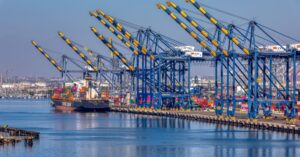Global commerce continues to boom, as companies seek business opportunities in lucrative foreign markets. According to Forrester, global e-commerce is projected to grow at an 8.9% CAGR between 2024-2028, reaching $6.8 trillion and representing 24% of all global retail.
Mexico and Canada have a regional trade agreement with the US and are natural markets, as are countries in the European Union. China (agricultural goods, electronics, machinery), India (technology, medical equipment, defense), Brazil (agricultural equipment, aerospace, chemicals), Japan (beef, pork, high-tech products) and South Korea (tech, defense equipment, energy) are also strong trading partners.
As a result demand for international shipping is increasing. According to Statista (subscription required), global freight forwarding is projected to reach $370 billion by 2029, up from $285 billion in 2024, for a CAGR of 5.4%.
This is where the services of an experienced freight broker come into play. Brokers leverage digital tools and deep experience to handle the growing complexities of global trade. They simplify and optimize international shipping through expertise in customs compliance, carrier selection and booking, and route optimization.
Brokers also coordinate multiple logistics providers to streamline shipments, reducing costs and mitigating delays to streamline global trade for shippers.
Challenges of Global Shipping
Want to expand your business overseas? Great! But keep in mind that global shipping comes with a unique set of challenges compared to domestic transportation.
Complex Regulations, Trade Agreements
Each country has its own customs requirements, including different tariff structures, required documentation, product classifications, and prohibited or restricted goods. While more than 200 countries and territories adhere to the Harmonized System (HS) for classifying goods, many have additional digits tied to specific national or regional requirements. This leads to discrepancies in classification and duty rates.
The US enjoys free trade agreements with Australia, South Korea, Singapore, Israel, and Chile. While the EU is a major trading partner, there is no FTA, although there is a Technology and Trade Council (TTU). Regional FTAs exist in Central America and the Middle East (Bahrain, Jordan, Oman). A Generalized System of Preferences (GSP) provides tariff benefits to developing countries.
Transit Options and Impact on Rates
The large distances present particular challenges. Companies have to weigh cost against urgency when considering standard ocean freight (20-45 days), expedited ocean (8-15 days), standard air (4-7 days) and expedited air (1-3 days). In any case, there are intermodal handoffs to rail and/or trucking carriers, requiring tight coordination and planning.
There is also considerable rate volatility based on shifting market conditions and disruptive forces. Ocean freight is expected to remain high through 2025 due to the threat of protectionist tariffs from president-elect Donald Trump as well as ongoing threats from Houthis in the Red Sea.
Air freight demand is also expected to remain elevated next year for most routes, partly due to ocean freight volatility. Capacity is projected to increase about 4% while demand rises about 20%. This 5x imbalance certainly means rates will continue to rise. An expected de minimis clampdown in the US will only lead to demand shifting to markets with lower barriers, experts said.
Visibility and communication are critical in global shipping. Real-time tracking ensures better decision-making and reduces delays. Clear, consistent communication among logistics partners is necessary in order to navigate complex supply chains and get goods delivered on time.
What Freight Brokers Bring to the Table
An experienced freight broker has deep knowledge of regulations and various trade agreements. They handle all necessary paperwork for international shipping on behalf of clients, including customs declarations, bills of lading, and invoices. Brokers also ensure that all pertinent regulations are adhered to, including customs laws and safety standards.
While trade compliance is ultimately the shipper’s responsibility, freight brokers are experts in customs regulations and tariffs. They can provide guidance on country-specific trade agreement rules, ensure proper HS classification and documentation, mitigate risks of penalties by catching compliance issues, and provide guidance on tariff benefits under free trade agreements.
Brokers have access to a wide network of reliable carriers, providing competitive pricing through volume discounting. They act as intermediaries, helping shippers find the best options, negotiate rates, and manage logistics.
Freight brokers can also integrate ocean, air, and land modes, optimizing routes, shrinking transit times, and reducing costs. They can also advise shippers on how to optimize container loading, and when it makes sense to choose less-than-containerload (LCL) vs. full containerload (FCL). All of this helps ensure efficient transportation tailored to a shipper’s particular needs.
With a broker partner managing logistics, shippers get a single point of contact that can help quickly resolve any issues. They can help them navigate port delays, strikes, or route changes in order to reduce disruption and minimize delays. A centralized approach reduces confusion and improves efficiency.
The Freight Broker Advantage in Global Expansion
While opportunities abound in cross-border trade, with e-commerce rising and customers in foreign markets eager to purchase US goods, the logistics are quite complex. Between tariffs and trade agreements, customs clearance, carrier selection and supply chain disruptions, there’s a lot to manage.
For this reason, an experienced freight broker can be an invaluable partner, helping shippers navigate the complexities, freeing them up to focus on growing their business.
With more than a quarter century of experience, COGISTICS TRANSPORTATION offers 3PL solutions that combine agility, efficiency, regulatory expertise, and cutting-edge technology. Its advanced tools provide peace of mind on every shipment with port-to-door tracking. It’s all built to provide you with a tailored, streamlined experience across land, air, and ocean freight operations, whether domestic or international. When time is of the essence, COGISTICS offers reliable, cost-effective expedited freight solutions. Contact us today to get started.




